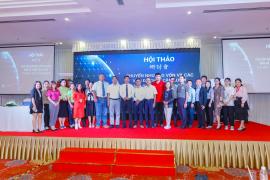A NEEDED PUSH INTO REMOTE AUDITING
Accounting professionals have debated how, or if, to conduct audit work from remote locations for years, but the COVID-19 pandemic quickly accelerated the practice when travel and in-office work suddenly became infeasible for most. We spoke with the leaders of three small firms about the lessons they learned when they increased remote auditing work during the pandemic, including what they plan on continuing or doing differently as they move forward.
Below is their advice, as well as input from Jennifer Wilson, the co-founder and partner of ConvergenceCoaching LLC, who has long been advising accounting firms to embrace remote auditing.
"Many of the assets being audited are digital and they can access and assess [them] from anywhere," Wilson said. "Remote auditing doesn't mean 100% remote. It doesn't mean no client contact or in-person meetings but means doing most of the audit work remote [physically] from the client location."
Wilson's consulting firm conducted its latest biennial Anytime, Anywhere Work survey in 2020 and found 61% of the 223 CPA firms surveyed plan to conduct more than half of their audit work remotely in the future. That same question, when asked pre-pandemic, only had 17% of firms indicating they'd conduct the majority of their audit work away from client locations.
Remote audit preference
Taking the plunge into remote auditing work were two small firm owners, Zoe Davis, CPA, president of Davis & Company CPAs in Mount Pleasant, S.C., and Adam King, CPA, founder and CEO of King Consulting Group in Raleigh, N.C.
For this audit season, many of Davis's clients indicated they preferred remote audits. "We will be scheduling our calendar-year ends on a case-by-case basis, depending on how the clients feel, but we expect 85% of our audits will be remote again this year," Davis said.
King found remote work created more efficient experiences for staff and clients.
"It is a different operating environment, because audit teams are not sitting at their clients' for months, which many clients don't love," he said. "It is a remote world, and I promote the fact that our firm can be remote all the time but also be available to clients if they want us to be on-site."
Building relationships during on-site audits can be more challenging when auditors are not interacting with clients who are pressed to find space for visiting auditors, or when fieldwork is compressed into a short period of time.
"Clients value time spent building the relationship and getting valuable advice from their auditors, but that isn't usually happening during fieldwork, which can be done more efficiently from the firm's office in many, many cases," Wilson said.
Having the option to do parts or even all of an audit remotely can also help retain CPAs who may become overwhelmed with frequent travel over time, Wilson said.
"Audit staff who have significant commutes or travel to clients burn out over time, especially as they start families, and it creates fragility for firms," Wilson said. The quality of audits is likely to suffer more from staff turnover than from being done remotely, she suggested.
Off-site and on-site mix
While there were positive things learned early in the pandemic, and some clients like remote audits, Lesley Kelly, CPA, partner at DarverKelly LLP in Greenville, S.C., said she is determined not to be fully remote.
"Our firm is a collaborative and extroverted group, and because of our personalities we have cultivated clients who want and appreciate communications," she said. "Audit is a two-way street, with auditors providing a resource to clients by sharing information, which happens more easily as we spend time together."
However, she is being considerate to her clients and staff and taking COVID-19 precautions to protect them if they do go on-site.
King said he found remote work cheaper for his clients and firm and provided his employees and contractors with a more flexible work environment.
Wilson, however, recommended keeping pricing for remote work at the same level that in-person work would command, minus any applicable travel costs. The value to the client and quality of the work will be the same whether or not a CPA is at the client's facilities, and it's important to have pricing reflect that, she said.
Embracing technology and new work structures
Kelly and Davis noted certain audit requirements may be challenging to incorporate into a remote financial statement audit and they cannot be sacrificed. Auditors need to exercise their best judgment in those scenarios and ensure that the necessary or required procedures are properly completed.
Review of documentation, inquiries of management, and observation of client activities are areas that can be difficult to achieve using Zoom, while observing activities in real time provides valuable information, Kelly said.
"Our auditing standards must be met in these areas," Kelly said. "It is important to discuss how that can be done during planning, because we may not be able to maintain a completely virtual audit from a quality of work standpoint."
Some firms have taken a creative approach, Wilson said, employing drones and other technology for inventory control. She suggested having a video kickoff meeting before the audit to explain to the client how the auditors will work, introduce any shared technology, and give information about next steps and due dates. Some firms have even purchased technology for clients to help with video access or to digitize paper documents more easily.
If auditors face difficulties getting the data they need when remote, she suggested setting up a standing video meeting each day at the same time to bring attention to unresolved items or concerns and keep the clients focused on what's needed next. That approach can be used as well when managing a remote or distributed audit team, by having a daily check-in for progress and to keep things moving.
Davis's firm uses video chats, more emails, and phone calls to gather information and does a lot of work off-site. Occasionally they have to schedule in-person walkthroughs, internal control discussions, or an inventory observation.
"As a result of COVID we were more thoughtful about improving the client experience, so we did more planning upfront and had one staff gather all our questions and send one email to the client with a link to our platform," she said. "We scheduled meetings for clients to answer questions, and they told us in exit conferences they were satisfied with how [the audits] went and found [them] less disruptive."
Wilson is encouraged by how quickly firms moved to remote work when the conditions of the pandemic called for it. She predicts remote auditing is here to stay and encourages those still holding back to talk to peers about their experiences.
"Auditing will be increasingly conducted remotely, and more strategic discussions and activities will happen with clients in person, outside of the audit cycle," she said.
Source: www.journalofaccountancy.com
--------
 WinWin Audit Firm
WinWin Audit Firm













